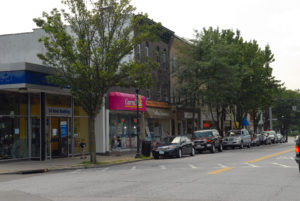A recent proposal from the Department of Public Works in Harrison to discontinue its commercial garbage program has attracted attention from both local business owners and the local Teamsters union, who expressed concerns about the proposal at the Harrison Town Council meeting on March 17.
The commissioner of Public Works, Tony Robinson, told the council that it is unsustainable to continue the commercial pickup and recycling program in its current state. His request to the board would involve the DPW to only pick up trash that does not exceed more than two 48-gallon garbage pails.
“The numbers speak for themselves,” Robinson said. “The two options on the table [are] to eliminate the [commercial] service…and to eliminate five vacant positions, or to raise the [commercial pickup] rates to recoup 100 percent of our costs.”
Robinson added that a potential fee increase local businesses would face from the DPW’s service would exceed the cost of subscribing to private trash pickup.
Several concerns were raised by locals during the public hearing about the cost of hiring private sanitation if the town was to discontinue the service, while others were worried about how it might affect the landscape of Harrison’s business district.
“If you’re going to go to private carting, how unsightly will it be when people don’t pay their bills or are delinquent, and the trash isn’t picked up going down Halstead Avenue?, asked Jim Murabito, the owner of Harrison Beverage Center on Halstead Avenue. “Our town already isn’t in the greatest of appearances.”

According to town Councilman Steve Malfitano, a Republican, the town has been forced to pick up a hefty difference to keep the program afloat. He said the cost of maintaining the commercial garbage and recycling program is $1 million, and the revenue brought in from the commercial pick up fees is only $250,000 a year, resulting in an annual net loss of approximately $750,000 for Harrison.
The meeting was also attended by several members of Local 456, the branch of the Teamsters union that currently covers trash pickup for Harrison. The vice president of the branch, Dominick Cassanelli Jr., said that the union believes that such a move would be a “detriment” to the workers currently picking up trash in Harrison.
“Eventually, you’ll have pickets and strikes in front of commercial property owners because some of these [private pickup] guys are not going to be signed to unions,” Cassanelli said. “And then once they stop picking up the garbage, because they’re being picketed, the garbage will be left on the streets.”
Robinson said that the DPW has rescinded three vacant jobs openings, and will not be filling two more positions that are currently held by soon-to-be retirees who are leaving in May, but won’[t be laying off any employees.
Malfitano said that avoiding layoffs is a priority for the council.
“Our public employees are paramount to us, and we’ve always been considerate of them,” he said.
In addition to local businesses, this change would apply to schools and some churches as well. However, according to Mayor Ron Belmont, a Republican, the council has had a conversation with the Harrison Superintendent of Schools Louis Wool about this, and he is receptive to the idea of the service cancellation.
“There isn’t any way that everyone is going to be happy, but when we look at the program, the range of use, and the cost as something that needs to be addressed from the taxpayer standpoint,” Malfitano said, “we see an opportunity to not reduce services, but reduce expenses so we don’t have to raise taxes.”
No vote took place on the issue at the March 17 meeting, and Malfitano said that it will “take some time” for the issue to be fully resolved.
Robinson could not be reached for comment as of press time.








